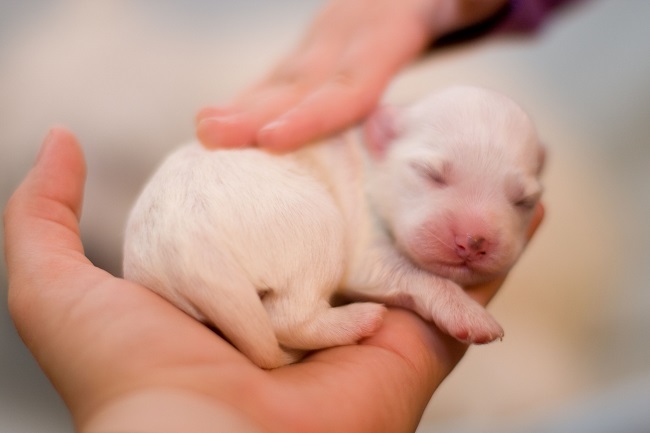The sight of a newborn puppy can be irresistible, often leaving us tempted to pick up and cuddle these adorable little creatures. But is it safe to touch a newborn puppy? The answer is nuanced and depends on a variety of factors.
This article delves deep into the subject, providing a detailed guide on when and how to handle newborn puppies safely.

When Can You Touch a Newborn Puppy?
Newborn puppies are delicate, and their first few weeks of life are critical. While it’s not entirely off-limits to touch them, it is crucial to minimize handling during their first few days of life.
Read Also:
If possible, only the mother and primary caregiver should be in contact with the puppies during this time.
The Mother’s Instincts
A mother dog, particularly if she’s a first-time mom, might become anxious if her puppies are handled too much, especially by unfamiliar people. This could potentially lead to aggressive protective behavior or, in extreme cases, rejection of the puppies.
The Puppies’ Health
Newborn puppies have a developing immune system and are susceptible to infection. Minimizing handling can reduce the risk of introducing harmful bacteria or viruses.
Precautions While Handling Newborn Puppies
If handling a newborn puppy becomes necessary, such as for feeding, cleaning, or health checks, certain precautions should be taken.
Sanitize Your Hands
Always wash and sanitize your hands before touching a newborn puppy to prevent the spread of harmful pathogens.
Be Gentle and Supportive
Ensure you’re gentle while handling a puppy. Support their body, especially the head and neck, as they cannot do it themselves yet.
Maintain Warmth
Newborn puppies cannot regulate their body temperature and are prone to hypothermia. If you need to handle them, ensure they are returned to their warm environment as soon as possible.
The Importance of Socialization
From around three weeks of age, puppies begin to open their eyes and ears, marking the beginning of their socialization period. It becomes crucial to have gentle human interaction at this stage to help puppies grow into well-adjusted, sociable dogs.
When To Consult A Veterinarian
If a puppy appears unwell or if the mother dog shows signs of stress or rejects her puppies, it’s critical to consult with a veterinarian or a professional breeder.
Monitoring Newborn Puppy Health
A critical aspect of handling newborn puppies involves monitoring their health. Here’s what to look out for:
Regular Weight Gain
Healthy puppies should gain weight steadily every day. If a puppy is not gaining weight or, worse, losing it, it could indicate a health problem that needs immediate veterinary attention.
Hydration and Feeding
Newborn puppies should feed from their mother regularly. If you notice a puppy is not feeding, or the mother isn’t producing enough milk, consult a vet immediately. Dehydration can be life-threatening to newborn puppies.
Understanding Puppy Development Stages
Understanding puppy development stages can guide your interaction with them:
Neonatal Period (0-2 weeks)
Puppies are born blind, deaf, and completely dependent on their mother. They spend most of their time sleeping and feeding.
Transitional Period (2-4 weeks)
Puppies start opening their eyes and ears. Their teeth begin to emerge, and they start to walk.
Socialization Period (4-12 weeks)
Puppies become more active and start to interact with their surroundings and other beings. This stage is vital for their social development.
The Role of a Breeder or Caregiver
As a breeder or primary caregiver, your role in the early stages of a puppy’s life is vital:
Facilitate a Calm Environment
Ensure the mother and her puppies have a quiet, warm, and safe space where they won’t be disturbed.
Monitor the Mother’s Health
The health of the mother dog is crucial for her puppies. Regularly check her for signs of mastitis, exhaustion, or any other health issues.
Gradual Socialization
Introduce puppies to mild stimuli and gentle handling to get them used to human interaction and various sounds and sights.
Read Also:
Conclusion
While it may be tempting to touch and cuddle a newborn puppy, their health and safety must come first. Minimize handling during the first few days, and when necessary, handle them gently and hygienically.
As they grow older, appropriate human interaction plays an integral role in their development. Remember, responsible care in these initial stages can help ensure your puppy grows into a healthy, sociable adult dog.
























